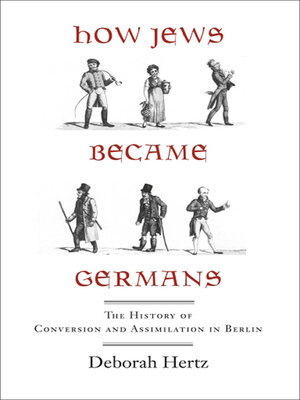How Jews Became Germans
ebook ∣ The History of Conversion and Assimilation in Berlin
By Deborah Hertz

Sign up to save your library
With an OverDrive account, you can save your favorite libraries for at-a-glance information about availability. Find out more about OverDrive accounts.
Find this title in Libby, the library reading app by OverDrive.



Search for a digital library with this title
Title found at these libraries:
| Loading... |
A "very readable" history of Jewish conversions to Christianity over two centuries that "tracks the many fascinating twists and turns to this story" (Library Journal).
When the Nazis came to power and created a racial state in the 1930s, they considered it an urgent priority to identify Jews who had converted to Christianity over the preceding centuries. With the help of church officials, a vast system of conversion and intermarriage records was created in Berlin, the country's premier Jewish city. Deborah Hertz's discovery of these records, the Judenkartei, was the first step on a long research journey that led to this compelling book. Hertz begins the book in 1645, when the records begin, and traces generations of German Jewish families for the next two centuries.
The book analyzes the statistics and explores letters, diaries, and other materials to understand in a far more nuanced way than ever before why Jews did or did not convert to Protestantism. Focusing on the stories of individual Jews in Berlin, particularly the charismatic salon woman Rahel Levin Varnhagen and her husband, Karl, a writer and diplomat, Hertz brings out the human stories behind the documents, sets them in the context of Berlin's evolving society, and connects them to the broad sweep of European history.
When the Nazis came to power and created a racial state in the 1930s, they considered it an urgent priority to identify Jews who had converted to Christianity over the preceding centuries. With the help of church officials, a vast system of conversion and intermarriage records was created in Berlin, the country's premier Jewish city. Deborah Hertz's discovery of these records, the Judenkartei, was the first step on a long research journey that led to this compelling book. Hertz begins the book in 1645, when the records begin, and traces generations of German Jewish families for the next two centuries.
The book analyzes the statistics and explores letters, diaries, and other materials to understand in a far more nuanced way than ever before why Jews did or did not convert to Protestantism. Focusing on the stories of individual Jews in Berlin, particularly the charismatic salon woman Rahel Levin Varnhagen and her husband, Karl, a writer and diplomat, Hertz brings out the human stories behind the documents, sets them in the context of Berlin's evolving society, and connects them to the broad sweep of European history.






